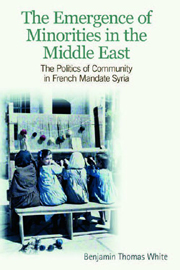Book contents
- Frontmatter
- Contents
- Map 1. Syria c.1936
- Map 2. The Far Northeast of Syria in the 1930s
- Outline Chronology of the French Mandate, 1919–39
- Acknowledgements
- Introduction
- Part I
- Part II
- 3 Separatism and Autonomism
- 4 The Border and the Kurds
- Part III
- Conclusion: Minorities, Majorities and the Writing of History
- Select Bibliography
- Index
4 - The Border and the Kurds
from Part II
Published online by Cambridge University Press: 12 September 2012
- Frontmatter
- Contents
- Map 1. Syria c.1936
- Map 2. The Far Northeast of Syria in the 1930s
- Outline Chronology of the French Mandate, 1919–39
- Acknowledgements
- Introduction
- Part I
- Part II
- 3 Separatism and Autonomism
- 4 The Border and the Kurds
- Part III
- Conclusion: Minorities, Majorities and the Writing of History
- Select Bibliography
- Index
Summary
Introduction
In the spring of 1939, the French High Commissioner planned a visit to the Jazira. So nationalists in Qamishli asked the beleaguered National Bloc government to send them Syrian flags, and flagpoles to hang them on during his visit. They wanted ‘to show their sound nationalist feeling’, and demonstrate this turbulent region's loyalty to Damascus. But hostility to Damascus was strong there, too, and when the flags arrived at the local railway station a group of anti-nationalists tried to intercept them. The stationmaster at first refused to give the flags to anyone other than the addressee, and with seventy armed nationalist youths guarding them, the anti-nationalists hesitated to press him. It was only when they returned with a detachment of Circassian troops sent by the local French officer that the stationmaster was persuaded to relinquish the packets containing the flags. ‘Then’, wrote the Minister of the Interior, ‘they opened them near the municipal offices [dā'irat al-baladiyya] and burned them before a crowd of people, and carried out acts of the basest kind [a‘māl sāfila lil-ghāya].’ The qa‘immaqam of Qamishli was more specific. One Dawud ‘Aziz Hana ‘donated a Syrian pound from his own pocket to whoever would urinate on the Syrian flags after burning them, and indeed paid the Syrian pound to one of the rabble [shakhs min awbāsh al-nās]’, since the latter did just that.
There are many interesting things about this incident, but one thing is interesting by its absence: the Syrian–Turkish border. Qamishli was a border town, and the recently-drawn border ran just south of the railway line.
- Type
- Chapter
- Information
- The Emergence of Minorities in the Middle EastThe Politics of Community in French Mandate Syria, pp. 101 - 128Publisher: Edinburgh University PressPrint publication year: 2011



